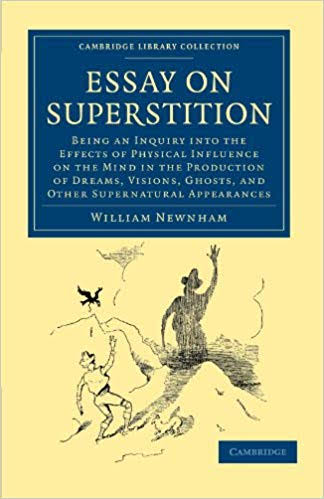Essay On Superstition
 Introduction: A blind belief in augury, magic, omens hearsay. the baseless thing, illogical manners is superstition. It finds a fertile soil and breeding ground in human ignorance and lack of scientific knowledge.
Introduction: A blind belief in augury, magic, omens hearsay. the baseless thing, illogical manners is superstition. It finds a fertile soil and breeding ground in human ignorance and lack of scientific knowledge.
Source of superstitions: In today’s world, people still believe in omens and auguries. Even in the age of rapid advancement of • science and technology, they are afraid like their forefathers living in the caves and connect their misfortunes with mysterious and unknown forces. Such a state of mind always gives rise to various types of superstitions.
Animals and human sacrifices to appease the unknown black force’s reflect man’s intellectual bankruptcy, primitiveness, and ignorance. On the other hand, much fraud is being perpetrated in the name of astrology, palmistry, Occult science, rituals, and the so-called religious faiths. Man is still afraid, awed, and hunted by the fear of the unknown inexplicable trouble and suffering through the offerings to the ghosts.
People’s impression: Impression in people differs from man to man. Hence most people are afraid of the unlucky number 13. This number often brings misfortune for them, they think. The eclipse of the sun and the moon, the shooting star, cries of owls, ravens, mewing, howling, braying etc. are superstitions.
They take them to be ill-omens. Again people wear the elements of stones, rings, armlets, a talisman to remove their baseless fear in case of diseases like fever, diarrhea, pox, influenza etc. They also believe in fakirism. Without undergoing the treatment of doctors, rural women do everything in a very orthodox manner.
Origin of superstitions: All superstitions have their origin in human psychology of fear of ill-luck, insecurity and the dread of inexplicable forces in nature. When some phenomena cannot be made out or explained, people start dreading them and assign them supernatural, divine and mysterious origins. Tantriks, priests godmen, babas, other vested interests also help in spreading superstitions. In superstition, the astrologers, priests, stargazers, magicians, god-men, quacks and babas have a very good business.
Firm beliefs in charms, supernatural powers, ghosts, goblins, witches, evil spirits have their deep roots in superstitions. It is a vile as it makes us deprived of self-confidence, self-control, rationality, farsighted power etc. by weakening our willpower and spirit. It is a bar to take an unswerving determination or decision to do anything either at present or in future. It results from ignorance and irrational fear.
There are lucky and unlucky numbers, days, things, animals, birds etc. Most people do not intend to start any work on Saturday. They think this day to be an unlucky day. Many people are not willing to cut down bamboos on Tuesday because the cutting down of bamboo on this day may bring an ill-luck and suffering for them.
The English still think number thirteen as inauspicious and ominous. They refuse to occupy even a room number 13. Many women are still lynched in some of the European countries because they are mistaken as witches. Our superstitions have blurred the dividing line between religion and blind belief, bigotry, and spiritualism, prayer, and incantation etc.
Don’t Forget to Check: Essay in English
Our superstition: To know the lucky and auspicious days we consult with the astrologers, palmists, priests, and god-men. Being well advised by them we start a new project, journey, and business. Likewise, the date and time of marriage, inauguration, the foundation of anything, filling in nomination papers are fixed, determined and communicated in accordance with the suggestion and advice of the astrologers and the positions of the planets and stars.
All superstitions have common origins. Superstitions are thriving in a large scale under the auspices of various cults, religious sects, good men and priests. They prevail in every society, nation, and community. In a superstitious atmosphere, for thence telling becomes a bumper business. Astrologers, sooth Sayers, good men, and priests have a great demand not only to the illiterate, poor and the ignorant but also to the rich, well-off, highly educated people, leaders, and eminent politicians.
Conclusion: This is the age of reason, science, and technology, yet many primitive superstitions continue endlessly.

No comments